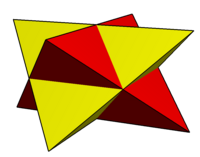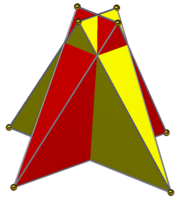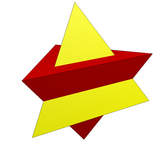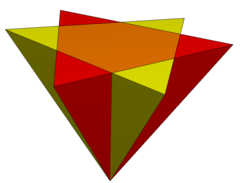Compound of two tetrahedra

In geometry, a compound of two tetrahedra is constructed by two overlapping tetrahedra, usually implied as regular tetrahedra.
Stellated octahedron
[edit]There is only one uniform polyhedral compound, the stellated octahedron, which has octahedral symmetry, order 48. It has a regular octahedron core, and shares the same 8 vertices with the cube.
If the edge crossings were treated as their own vertices, the compound would have identical surface topology to the rhombic dodecahedron; were face crossings also considered edges of their own the shape would effectively become a nonconvex triakis octahedron.
|
A tetrahedron and its dual tetrahedron |
|
|
Orthographic projections from the different symmetry axes |
If the edge crossings were vertices, the mapping on a sphere would be the same as that of a rhombic dodecahedron. |
Lower symmetry constructions
[edit]There are lower symmetry variations on this compound, based on lower symmetry forms of the tetrahedron.
- A facetting of a rectangular cuboid, creating compounds of two tetragonal or two rhombic disphenoids, with a bipyramid or rhombic fusil cores. This is first in a set of uniform compound of two antiprisms.
- A facetting of a trigonal trapezohedron creates a compound of two right triangular pyramids with a triangular antiprism core. This is first in a set of compounds of two pyramids positioned as point reflections of each other.
| D4h, [4,2], order 16 | C4v, [4], order 8 | D3d, [2+,6], order 12 |
|---|---|---|
 Compound of two tetragonal disphenoids in square prism ß{2,4} or |
 Compound of two digonal disphenoids |
 Compound of two right triangular pyramids in triangular trapezohedron |
Other compounds
[edit]If two regular tetrahedra are given the same orientation on the 3-fold axis, a different compound is made, with D3h, [3,2] symmetry, order 12.
Other orientations can be chosen as 2 tetrahedra within the compound of five tetrahedra and compound of ten tetrahedra the latter of which can be seen as a hexagrammic pyramid:
See also
[edit]- Compound of cube and octahedron
- Compound of dodecahedron and icosahedron
- Compound of small stellated dodecahedron and great dodecahedron
- Compound of great stellated dodecahedron and great icosahedron
References
[edit]- Cundy, H. and Rollett, A. "Five Tetrahedra in a Dodecahedron". §3.10.8 in Mathematical Models, 3rd ed. Stradbroke, England: Tarquin Pub., pp. 139–141, 1989.












